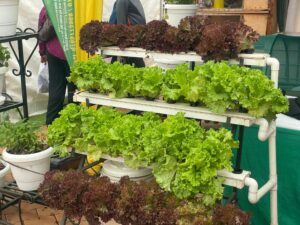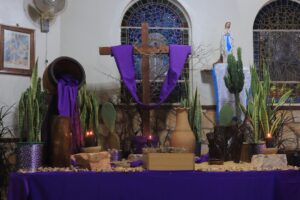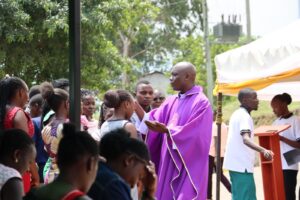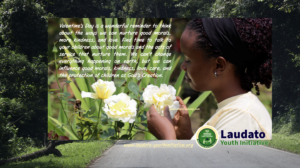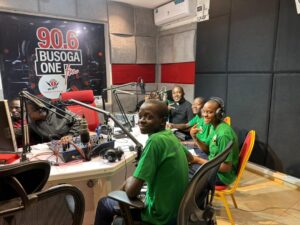By Laudato Voices | September 23, 2025.
Climate change is having severe and growing impacts in Uganda, especially among grassroots and vulnerable communities. These include erratic rainfall, recurrent droughts and floods, water scarcity, loss of soil fertility resulting from unsustainable land management, and threats to food security. This reflection argues that community‑based adaptation (CBA), which aligns local agency, indigenous knowledge, spiritual values, innovation, and technology-based solutions, offers a sustainable path forward. We at Laudato Youth Initiative (LYI), a youth and faith‑based initiative, are well placed to scale up such efforts. Drawing on existing adaptation work, knowledge gap, and increasing need for sustainability and climate resilience among many grassroots communities in Uganda, this inspires LYI’s own programs, which propose a model for strengthening resilience among vulnerable focusing on the youth whose future may suffer most of these consequences and grassroots communities if we do not promote climate resilience, adaptation, and sustainable land management.
Uganda’s grassroots communities, especially the overpopulated, mountainous, and lowland areas, are facing increasingly unpredictable weather patterns. Prolonged droughts followed by heavy rains, flash floods, and degradation of agricultural lands are undermining subsistence farms, reducing crop yields, and exacerbating water scarcity. Water sources dry up or become contaminated; soils erode; and the nutritional and economic stability of households is threatened. Many children are missing school because of reduced food availability or time spent collecting water, or roads swept by floods. These are not distant futures; they are happening now.
Official statistics reinforce the urgency. For example, only about 17% of Ugandans have access to safe water in their compounds (New Vision, 2023). At the same time, poverty, weak infrastructure, and limited access to technical support make adaptation especially difficult for many communities.
In response, community‑based adaptation (CBA), which is locally designed, locally owned, and culturally appropriate, has become essential, which is why LYI emphasizes locally tailored solutions. CBA strategies leverage indigenous knowledge, local leadership, ecological practices, and participation of young people. The Laudato Youth Initiative (LYI), inspired by Laudato Si’, combines faith, youth leadership, and environmental action. Its networks of Laudato Si Clubs in schools, parishes, and communities provide a platform through which resilient responses can grow. This reflection describes how LYI can and is deepening its role in climate‑vulnerable regions of Uganda among the youth in institutions and in grassroots communities via CBA and MAST strategies.

Lessons from Existing Adaptation Efforts in Uganda
Several national and local programs provide valuable lessons for designing effective adaptation.
First, WaterAid Uganda’s 2023‑2028 strategy emphasizes designing water, sanitation, and hygiene (WASH) infrastructure that can withstand climate variability. The strategy integrates resilient infrastructure for rural schools and communities, anticipating the higher frequency of droughts and flooding (WaterAid, 2023).
Second, CIFOR‑ICRAF’s recent work highlights the growing call among African scientists, youth, faith‑based organizations of which we were among, and local governments for increased climate finance directed at locally‑led adaptation (CIFOR‑ICRAF, 2025). They affirm that nature‑based solutions, climate‑smart agriculture, and community engagement are essential (CIFOR‑ICRAF, 2025). During the Africa Vatican Climate Summit.
Third, a number of projects in Uganda are already using innovative techniques: sustainable land management, agroforestry like our engagement with Bethany Lands Institute, rainfall harvesting, and ecosystem restoration. Also important are forums and youth gatherings like our Laudato Si Green Festival Program that enable the sharing of local adaptation ideas and peer learning.
From these examples, common success factors emerge: strong local ownership; ecological restoration; water security; inclusion of youth and women; integrating indigenous knowledge; resilient infrastructure; early warning systems; and supportive policy engagement.
Laudato Youth Initiative’s Current Strengths
The Laudato Youth Initiative already demonstrates many of the strengths needed for successful community‑based adaptation:
It maintains Laudato Si Clubs in schools, universities, parishes, and communities, which engage young people in tree planting, waste management, climate education, innovation, and technology-based solutions to foster transformative changes that are increasing the sustainability and climate resilience of Uganda’s agricultural sector by promoting sustainable agriculture, aiming at resilience.
We are running a One Million Tree Planting Drive, focusing on fruit and indigenous trees to restore degraded lands, improve biodiversity, increase nutrition, protect watersheds, and reduce carbon emissions.
LYI integrates indigenous knowledge and traditional ecological practices in its environmental programs, ensuring adaptation strategies are culturally rooted as a way to engrain the African interpretation of Laudato Si.
We harness youth leadership, media advocacy, smart gardens, eco innovations, and community education as tools to spread ecological awareness and build capacity.
These existing and additional capacities provide a strong base upon which LYI can expand its adaptation based on the MAST model.
Proposed Community‑Based Adaptation Strategies
With all the above, there is a lot more that needs to be done to build resilience in vulnerable regions. LYI can scale up and deepen its engagement through the following strategies:
Resilient Water Access and Management
LYI can support rainwater harvesting, protect springs and catchment areas, and educate youth on water conservation if there come along potential partners or NGOs with technical expertise to ensure reliable design and sustainability.
Climate‑Smart Agriculture and Food Security
Promoting agroecology (e.g., intercropping, agroforestry, drought‑tolerant indigenous crops), supporting school and parish demonstration gardens, and providing access to climate information and extension services will help buffer households against precipitation variability is something we are already doing within our means but need partners to implement it fully. Our Laudato Si Clubs already run some activities.
Ecosystem Restoration and Land Management
Focused efforts toward reforestation, protection of wetlands, and restoration of riparian zones and hillside lands can reduce erosion, improve soil moisture, and revive ecosystem services. We need to set up an education centre that will strengthen our capacity. Coalitions of stakeholders and good-willed partners can be a breakthrough to scale up our work, incubate and accelerate new climate-smart services to promote sustainable practices and land use.
Community Education and Indigenous Knowledge
Documenting, reviving, and sharing traditional coping mechanisms (such as local seed saving, cropping patterns, water harvesting) through our Laudato Si clubs and elder knowledge keepers; integrating climate literacy into school curricula; using arts, drama, and peer education for greater reach. Something our Clubs have taken on but still need implementing partners in our efforts to document digital stories of what is happening to our common home.
Resilient Infrastructure and WASH Services
Advocate for climate‑proof infrastructure such as durable water supply systems, WASH facilities in schools, and safe sanitation in flood‑ and drought‑prone zones. Ensure that such infrastructure is maintained and managed locally.
Youth Leadership, Innovation, and Monitoring
Encourage youth to use technology (mobile apps, remote sensors, weather forecasting) for monitoring environmental indicators, early warning, and adapting farming or water practices. Also, ensure that the youth have a voice in policy discussions at the local government level. All these are within our means if you are open to partnering with us to be able to scale up our impact. Email us at laudatoyouthinitiative@gmail.com
Role of Faith and Church Structures
Faith institutions play a critical role in facilitating adaptation in Uganda:
Moral foundations: Laudato Si’ frames care for the environment as a moral obligation, emphasizing stewardship, solidarity, and justice.
Trusted network: Churches reach remote communities. Parishes, schools, and dioceses can serve as hubs for spreading adaptation awareness and coordinating local action.
Resource mobilization: Faith networks often mobilize volunteers, local labor, and resources more efficiently because of shared trust and values.
Advocacy and policy engagement: Through platforms like the Laudato Si’ Action Platform and through engagements at regional resilience conferences (CIFOR‑ICRAF, 2025), faith‑based actors can help shape policies that support local adaptation. Our initiative is about this.
Implementation Plan
To operationalize these strategies, LYI needs your support and partnership to:
Build capacity through training in climate risk assessment, adaptation planning, resilient agriculture, water resource management, and monitoring.
Provide seed funding via micro‑grants for pilot projects such as demonstration gardens, small‑scale water systems, and tree nurseries, as most of our youth and grassroots communities find this a challenge.
Open to partnerships with government ministries (e.g., Water and Environment), NGOs (e.g., WaterAid), research institutions, and technical experts to bring needed knowledge and funding.
Monitor and evaluate adaptation pilots to assess effectiveness, document lessons learned, and refine approaches.
Foster youth innovation by supporting climate‑smart tools (IoT, mobile tech, early warning systems) and promoting creative solutions drawn from youth participation.
Communicate and advocate through schools, parishes, media, festivals, and faith gatherings to raise awareness, share success stories, and influence policy.
Expected Outcomes
If implemented effectively, this model could lead to:
More reliable water access for homes, farms, and schools in vulnerable regions.
Increased food security via resilient agricultural practices.
Healthier ecosystems, less erosion, improved biodiversity, and restored wetlands.
Empowered young people with leadership, innovation, and ownership of local adaptation efforts.
Stronger influence of community voices in local policy and planning.
Conservation of indigenous species and restoration of natural landscapes.
Challenges and Mitigation
Some challenges include:
Insufficient funding and resources: Many communities lack capital; this can be mitigated by building partnerships with international donors and tapping into faith‑based funding networks.
Technical expertise gaps: Some adaptation demands technical knowledge; partner with research institutions and government extension services.
Project sustainability: Infrastructure and ecological projects require long‑term maintenance; embedding ownership locally, training, and maintenance plans are essential.
Behavioral and cultural barriers: New agricultural or water practices may conflict with tradition; education, visible role models, and inclusion of elders/local leaders help overcome resistance.
In Uganda’s climate, vulnerable communities are already suffering the impacts of climate change. Community‑based adaptation is not optional; it is essential for survival, dignity, and the safeguarding of futures. The Laudato Youth Initiative, with its faith‑based structure, youth leadership, and community presence, is uniquely suited to lead this work. By scaling CBA strategies that are locally grounded, spiritually anchored, and ecologically sound, LYI can help build resilience in Uganda’s most at-risk communities, and in doing so, demonstrate a model of adaptation that combines science, tradition, and faith.
References
CIFOR‑ICRAF. (2025). From Climate Crisis to Resilience: Reflection from the Vatican Africa Conference Summit at CIFOR‑ICRAF. Laudato Youth Initiative. Retrieved from https://laudato‑youthinitiative.org/2025/06/30/from‑climate‑crisis‑to‑resilience‑reflections‑from‑the‑vatican‑africa‑conference‑summit‑at‑cifor‑icraf/
CIFOR‑ICRAF. (2025, July 2). Experts call for increased climate finance to power locally‑led adaptation initiatives. Retrieved from https://www.cifor‑icraf.org/press/press‑release/experts‑call‑for‑increased‑climate‑finance‑to‑power‑locally‑led‑adaptation‑initiatives/
New Vision. (2023, October 8). Only 17% Ugandans have access to safe water. New Vision. Retrieved from https://www.newvision.co.ug/articledetails/172130
WaterAid Uganda. (2023). WaterAid Uganda Strategy 2023‑2028.










